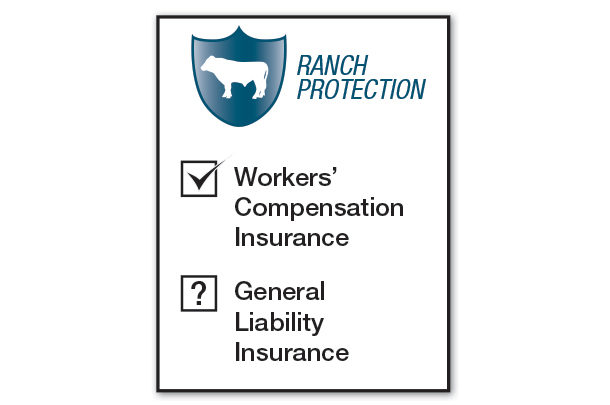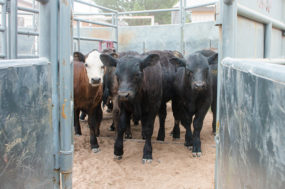Ranchers and farmers know working with livestock can cause injuries, occasionally even deaths, but do you understand how to reduce your legal risks and financial liabilities? If your state has something like a Farm Animals or Domesticated Animals Activity Act (for short, I’ll call them “FAAA”), ask yourself: Do you have the same protection as “a farm animal activity sponsor,” farm animal professional, livestock producer, livestock show participant or livestock show sponsor?
In a 2020 Texas Supreme Court decision, Conway Waak Jr. v. Raul Amparo Zuniga Rodrigues, the court ruled ranchers and farmers may not have protection under the Texas Farm Animals Activity Act if a ranch hand is injured or killed and they didn’t carry workers’ compensation insurance. Almost the exact opposite result occurred when the Iowa Supreme Court in 2009 decided Baker v. Shields, 767 N.W.2d 404 (Iowa 2009).
When I read these two cases, something that might account for the different outcome – one farmer liable, the other not – is the difference (most likely unintended by legislative draftspersons) where the Texas legislature wrote: “The term ‘farm animal activity sponsor’ means: (A) a person or group who sponsors …” and the Iowa legislature wrote: “A person, including a domesticated animal professional, domesticated animal activity sponsor … is not liable for the damages, injury or death suffered by a participant or spectator resulting from the inherent risks of a domesticated animal activity.”
In Iowa, the court held “… term ‘person’ when used in statutes should be broadly construed unless to do so ‘would be inconsistent with the manifest intent of the general assembly or repugnant to the context of the statute.’”
So the biggest takeaway should be: First, know those laws of your jurisdiction that are important to your business. Grammar and words matter.
In Texas, the interplay of workers’ compensation laws and the FAAA affect your liability for a person injured or killed by your farm animal.
It does not matter what you and your workers thought, said or even put on a piece of paper. At least in Texas, the law may treat someone you thought was an independent contractor as your employee. As odd as it may seem, given a name like the Farm Animals Activity Act, Domesticated Animal Activity Act or the like, the FAAA may not protect you when someone working on or just visiting your ranch or farm is hurt or killed by a farm animal.
Despite training by the Waaks and working more than four years on their cattle ranch, working without help or supervision, Mr. Zuniga was killed by a bull. Mr. Zuniga’s family sued the Waaks, who had opted out of the Texas Workers’ Compensation Act (“TWCA”); their farm had become what is called a “nonsubscriber.”
At trial, Waaks claimed Zuniga was an independent contractor, that the FAAA applied. The trial court held the FAAA applicable and that it barred Zuniga’s claims.
Texas Court of Appeals overturned the trial court, holding because of the TWCA Mr. Zuniga was an employee, not an independent contractor and thus “… a hired ranch hand – not a ‘participant’ in a farm animal activity …” within the FAAA’s definitions of a “participant” and “farm animal activity.”
The Court of Appeals said the predecessor of FAAA, the Equine Activities Act, was designed to protect the tourism industry (horseback riding, etc.), and the Workers’ Compensation law prohibited those employers who choose not to cover their employees from claiming the employee was contributorily negligent, assumed the risk or was injured because of negligence of a co-worker. The court said nothing in the Equine Activity Act (by extension, the FAAA) was intended to limit employees’ rights against employers and that if someone was an “employee” under the definition of the Workers’ Compensation Act, they are not “a participant in a farm animal activity.”
The Court of Appeals also held Mr. Zuniga wasn’t an independent contractor under the Texas Workers’ Compensation Act (“TWCA”). To be an independent contractor of a farm or ranch under the TWCA, a person must be employed by another third party who is the employer of that worker, paying wages, directing activities and performing similar functions, etc., §406.165(b). The court held Zuniga and two others were the Waaks’ employees. Hitting that magic three-employees number, not having purchased workers’ compensation insurance, the Waaks, by statute (§406.033(a)), were barred from asserting Mr. Zuniga was contributorily negligent, assumed the risk or that a fellow employee’s negligence caused his injuries and death.
The Texas Supreme Court in June 2020 upheld the Court of Appeals’ decision. Mr. Zuniga was an employee, the FAAA does not apply to ranching, and since the Waaks had opted out of providing workers’ compensation insurance, the trial court must now hear facts and arguments about whether the Waaks were negligent.
Although the Texas legislature broadened the Equine Activity Act, including other farm animals besides horses, changing the name to the Farm Animals Activity Act, in all other respects Texas FAAA did not depart from the original purpose and express scope of the Equine Activity Act.
Before Texas adopted its Equine Act, 25 other states had, as the Texas Supreme Court noted, “beaten us to the punch.” The court further noted, “Included among the statute’s list of inherent risks was the propensity of an equine animal to behave in ways that may result in personal injury or death to a person on or around it,” as well as “the unpredictability of an equine animal’s reaction to sound, a sudden movement or an unfamiliar object, person or other animal.”
Although the FAAA had used some seemingly broad general terms, by using very specific examples, “with a 158-word sentence containing some 40 examples,” the Supreme Court held “The Equine Act’s prolixity [a fancy word for ‘longwinded’] made obvious that it was entirely concerned with equine activities unrelated to ranching – that is, breeding, feeding and working equine animals as (an) avocation. In all of its scores of examples, there was no hint of any application to ranchers and ranch hands’ involvement with horses. The omission must be meaningful.”
After 15 pages of analysis, the Supreme Court determined the FAAA does not cover ranchers and ranch hands when they are engaged in general ranching activities. Therefore, FAAA does not shield the Waaks from liability if they were without workers’ comp insurance, and their negligence resulted in Mr. Zuniga’s death.
Texas law does not require employers to purchase workers’ compensation insurance. But the law does state that employers whose operations are covered by the TWCA but who do not provide workers’ compensation insurance for their employees are barred from asserting three critically important civil law defenses: contributory negligence, assumption of the risk or the wrongful acts of another employee if an injured employee sues.
The TWCA provides two alternative tests having to do with the size of the farm or ranch and its workforce to determine if the operation is covered by the TWCA and must have workers’ compensation insurance in order not to forfeit the right to assert these important defenses.
TWCA § 406.162(a)(3)(B) provides TWCA applies to any farm or ranch that either has a gross annual payroll in an amount required for coverage of seasonal workers under Subdivision (a) (2)(B) (currently $25,000), or which employs three or more farm or ranch employees other than migrant or seasonal workers.
In other words, if a Texas ranch or farm falls below both the above payroll test (currently $25,000) and less than three employee rule, you do not have to have workers’ compensation insurance to preserve your common law defenses. But anyone but the smallest farmers or ranchers risk very substantial financial liability and possible ruin without workers’ comp insurance.
Even if you fall below the $25,000 and three-employee TWCA test, that doesn’t mean a Texas farmer or rancher will automatically win – far from it. Remember, an employee is not considered a “participant” within the scope of the exclusion in the FAAA, and so fitting into the small farm or ranch exemption from the TWCA will just mean you might be able to win if you can prove the “employee” was contributorily negligent or knew enough and assumed the risk of the activity or the accident was caused by the action of another employee. But to win will require legal fees and a great amount of time from ranching in order to defend the case. In the end, you still might lose on the facts.
What may be the most important question for ranchers and farmers everywhere is whether you should purchase workers’ compensation insurance as well as general liability insurance – and if not, what are the potential consequences?








